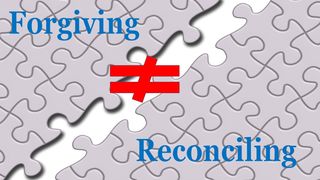Forgiveness
Do I Have to Reconcile with the Other When I Forgive?
If forgiving and reconciling are equated, what problems are created for you?
Posted November 6, 2019 Reviewed by Gary Drevitch

I read recently a post in which the authors (to go unnamed) stated that one forgives only when the one who hurt you shows remorse, apologizes, and then pays back what was taken from you.
Suppose someone steals your money. You forgive once the person pays the money back and expresses sorrow for the act. You then can cease your anger toward the person and come together again.
There are so many problems with this assertion. Where to begin? First, let us suppose the assertion is true: When you forgive, you reconcile.
Problem #1: The first step in your forgiving is to wait for the other to apologize. If that person refuses to do so, then you are trapped in unforgiveness. This is a problem because you cannot set yourself free from burning resentment until another person utters certain words. That is a lot of power over your emotional well-being. You do not want to give anyone that kind of power over you, especially people who are cruel to you.
Problem #2: The next step, according to the person making the assertions of forgiveness, is for you to get back what is owed. As in Problem #1, you are trapped in your anger or even hatred until the person is able to pay you. Again, you give power to another where you should not be giving power.
Problem #3: Suppose what was taken from you is an intangible such as your dignity. Suppose the person insults you in front of your best friends. What then is to be paid back? Even if the other apologizes in front of your friends and says what a wonderful person you are, how much of this is enough so that you now can forgive? The intangibles are not so cooperative as to let us know when the exact price has been paid.
Problem #4: Suppose now that you got your every wish: The other shows remorse or inner sorrow, deeply apologizes, and pays you back all that is owed. You are now completely content with all of this. Well, what then is there left to forgive? You have all you wanted and you are satisfied. Where is the offense now so that you can forgive the person? Even if you say that you were emotionally wounded in the past by the other's actions and so you can forgive for that, it still is the case that you are not emotionally wounded now. So what is the point in forgiving?
Problem #5: Now suppose that the one who hurt you is a masked stranger who demanded your wallet and pushed you to the ground breaking your arm. You do not know the person and it is likely this person never will be caught. How will you see the other's remorse, receive the apology, and get your wallet back? If we follow the advice of the bloggers, then forgiving becomes impossible, again thwarting your emotional healing.
Problem #6: The ones who asserted that you must await the other's remorse, apology, and recompense are confusing the moral virtue of forgiving and the behavioral response of reconciling. These are very different. Forgiving, as a moral virtue, starts with an internal insight that to be kind to those who are not kind to you is morally good. You then have a free-will decision to behaviorally offer that kindness and it is your choice. As is the case with any other moral virtue such as justice or patience, your decision to exercise that moral virtue is unconditional, not dependent on the actions of others before you can choose, for example, to be fair to others. The ones who asserted that forgiving and reconciling are the same just made forgiveness the only conditional virtue on the planet, one that cannot be offered until the other has remorse, apologizes, and repays.
A rebuttal to my position is this: As you wait for the other to apologize and to compensate you for the wrongdoing, you actually are showing respect for the other person, respect for the self, and respect for morality. How is this so? First, goes this rebuttal, you are asking that the other come up higher in a moral sense. Your withholding forgiveness gets the other's attention and so you withhold it for the other's sake. Second, you show the other that you are a person of respect by not giving in too quickly to forgiveness. Third, you show respect for morality because you now are honoring justice by waiting for recompense, which is owed to you.
My rejoinder to the above rebuttal: First, you can forgive and then ask the other to "come up higher," in a moral sense. Forgive and ask something of the other. Second, you can get the other's attention by proclaiming forgiveness as an act of mercy. This truly is attention-getting, especially if the other does not feel worthy of such a heroic act of mercy. Third, you can show respect for morality by forgiving and seeking justice together. How are you showing respect for morality when you push forgiveness out of the way and suffer with an unhealthy anger that could be yours for the rest of your life?
In our research lab at the University of Wisconsin-Madison, we started to study the psychology of forgiveness in 1985. Once we realized that forgiving and reconciling are definitely distinct concepts, we felt more comfortable publishing ideas of forgiveness in the social sciences. This was the case because this distinction (between forgiving and reconciling) defuses a potentially serious objection to forgiveness. For example, when Suzanne Freedman began her important work on forgiveness with incest survivors, we anticipated this criticism: "How dare you ask incest survivors to go back into relationships with people who abused them! Your ideas are dangerous!"
Suzanne was well aware of this criticism and was very careful in her forgiveness interventions to distinguish forgiving and reconciling with the women who suffered this kind of abuse. All 12 of her participants continued to meet with her one-on-one for about one hour a week for up to 14 months. At the end of that time, the participants went from being clinically depressed to not being depressed at all, and for the first group of participants, this diminishing of depression was still present over a year after the forgiveness intervention ended (Freedman & Enright, 1996). They were set free from an inner disruption that never should have been theirs. Forgiving unconditionally, without waiting for an apology, made all the difference. Regarding the issue of paying back what was owed, in this case that was not possible. Those who took advantage of the women (when they were girls) can never repay what was taken from them. If under this circumstance they could never forgive, that would have been exceptionally unfortunate for them. Their free-will choice to unconditionally forgive gave them their lives back.
Do you see how vital it is to get it right when you ask yourself this question: What, exactly, is forgiveness? Is it dangerous to forgive? Our answer might make a big difference in your own life and in the lives of others who could become the recipients of your displaced anger.

In our experience, forgiveness is this: You have been treated unjustly by another or others. You willingly decide to forgive when you are ready. When you do so, you try to get rid of resentment and offer goodness to the other. You do not necessarily reconcile if the other remains a danger to you. You do not make excuses for the other when you forgive and you do strive for justice when you forgive. Forgivers do not become weaklings. They stand in the truth that they have been treated with injustice and they respond with a softened heart, with the paradox that they themselves become emotionally healed.
For further empirically-verified scientific evidence that to forgive matters for one's emotional well-being, please see Enright et al. (2007), Lee & Enright (2014), Lin et al. (2004), Rahman et al. (2014), Reed & Enright (2006), Waltman et al. (2009), Zhao, Enright, & Klatt (2017). In each case, the intervener in these forgiveness programs was careful to distinguish forgiving and reconciling.
References
Enright, R.D., Knutson, J.A., Holter, A.C., Baskin, T., & Knutson, C. (2007). Waging peace through forgiveness in Belfast, Northern Ireland II: Educational programs for mental health improvement of children. Journal of Research in Education, Fall, 63-78.
Freedman, S. R., & Enright, R. D. (1996). Forgiveness as an intervention goal with incest survivors. Journal of Consulting and Clinical Psychology, 64(5), 983-992.
Lee, Y-R & Enright, R.D. (2014) A forgiveness intervention for women with fibromyalgia who were abused in childhood: A pilot study. Spirituality in Clinical Practice, 1, 203-217.
Lin, W.F., Mack, D., Enright, R.D., Krahn, D., & Baskin, T. (2004). Effects of forgiveness therapy on anger, mood, and vulnerability to substance use among inpatient substance-dependent clients. Journal of Consulting and Clinical Psychology, 72(6), 1114-1121.
Rahman, A., Iftikhar, R., Kim, J., & Enright, R.D. (2018). Pilot study: Evaluating the effectiveness of forgiveness therapy with abused early adolescent females in Pakistan. Spirituality in Clinical Practice, 5, 75-87
Reed, G. & Enright, R.D. (2006). The effects of forgiveness therapy on depression, anxiety, and post-traumatic stress for women after spousal emotional abuse. Journal of Consulting and Clinical Psychology, 74, 920-929.
Waltman, M.A., Russell, D.C., Coyle, C.T., Enright, R.D., Holter, A.C., & Swoboda, C. (2009). The effects of a forgiveness intervention on patients with coronary artery disease. Psychology and Health, 24, 11-27.
Zhao, C., Enright, R.D., & Klatt, J. (2017). Forgiveness education in the workplace: A new strategy for the management of anger. London Journal of Research in Humanities and Social Sciences, 17, 11-24.




